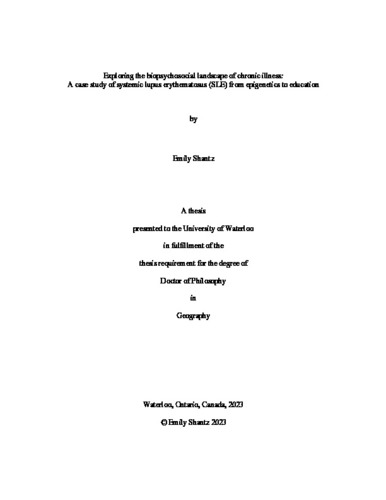UWSpace will be migrating to a new version of its software from July 29th to August 1st. UWSpace will be offline for all UW community members during this time.
Exploring the biopsychosocial landscape of chronic illness: A case study of systemic lupus erythematosus (SLE) from epigenetics to education
| dc.contributor.author | Shantz, Emily | |
| dc.date.accessioned | 2024-01-16 15:04:36 (GMT) | |
| dc.date.available | 2024-01-16 15:04:36 (GMT) | |
| dc.date.issued | 2024-01-16 | |
| dc.date.submitted | 2023-12-15 | |
| dc.identifier.uri | http://hdl.handle.net/10012/20236 | |
| dc.description.abstract | Systemic lupus erythematosus (SLE), or lupus, is a chronic autoimmune condition and global public health issue. SLE is uniquely characterized as gendered, racialized, episodic, invisible and idiosyncratic. SLE primarily impacts women, and most severely, women of colour. Cardiovascular disease (CVD) is a main driver of morbidity and mortality among SLE populations. Recent literature has begun to characterize both SLE and CVD as “biopsychosocial” and concomitant with place. However, the complex biological-social interplay influencing SLE disease trajectories, and morbidity and mortality from CVD in SLE, is not well understood. This thesis explores the biopsychosocial landscape of SLE with three main objectives: 1) to assess theoretical and methodological support for social epigenetics studies of SLE; 2) to investigate existing literature around social factors influencing the development of CVD in SLE; and 3) to engage knowledge users in the co-production of educational tools about the risks of CVD in SLE. Drawing on health geographical approaches, ecosocial and biopsychosocial theories, and feminist perspectives, a multimethods research design was employed involving narrative review, scoping review, focus groups, and interviews. This transdisciplinary process was supported by an embedded integrated knowledge translation (iKT) approach that included knowledge users as equal partners. This research positions social epigenetics as a novel and transdisciplinary line of inquiry to understand the development and trajectories of chronic diseases. While some theoretical and methodological support exists - with respect to ecosocial and lifecourse theories, and epigenome-wide association studies and exposomic approaches, respectively - expansion in both of these areas is needed with particular attention to intersectionality. Building on this theoretical foundation, and using SLE as a case study, the scoping review revealed several social factors demonstrated to be central to CVD in SLE populations: socioeconomic status, race, mental health, and gender. These results, and complementary information about CVD specific to SLE, were mobilized through the co-development of a lay language patient education resource. Through a focus group with key informants and interviews with patients, knowledge users advised on tailoring content, format, accessibility and inclusivity for the SLE community, with the ultimate goal of improving patient knowledge about CVD. This body of work makes theoretical contributions to the practical application of social epigenetics studies, integrating intersectional perspectives, and bridging basic and social science conceptualizations of health and ill-health. Methodologically, these studies contribute to the study of iKT frameworks and patient engagement in the context of chronic illness. This research collectively adds to our substantive understanding of SLE through a biopsychosocial lens, and the risk landscape of CVD in place. With respect to healthcare policy and practice, the findings herein may provide future targets for CVD risk assessment and prevention in the SLE context, inform educational and social interventions to support SLE treatment, and contribute to the development of a future patient-led research agenda for SLE in Canada. | en |
| dc.language.iso | en | en |
| dc.publisher | University of Waterloo | en |
| dc.subject | health geography | en |
| dc.subject | lupus | en |
| dc.subject | cardiovascular disease | en |
| dc.subject | knowledge translation | en |
| dc.subject | social epigenetics | en |
| dc.title | Exploring the biopsychosocial landscape of chronic illness: A case study of systemic lupus erythematosus (SLE) from epigenetics to education | en |
| dc.type | Doctoral Thesis | en |
| dc.pending | false | |
| uws-etd.degree.department | Geography and Environmental Management | en |
| uws-etd.degree.discipline | Geography | en |
| uws-etd.degree.grantor | University of Waterloo | en |
| uws-etd.degree | Doctor of Philosophy | en |
| uws-etd.embargo.terms | 0 | en |
| uws.contributor.advisor | Elliott, Susan | |
| uws.contributor.affiliation1 | Faculty of Environment | en |
| uws.published.city | Waterloo | en |
| uws.published.country | Canada | en |
| uws.published.province | Ontario | en |
| uws.typeOfResource | Text | en |
| uws.peerReviewStatus | Unreviewed | en |
| uws.scholarLevel | Graduate | en |

